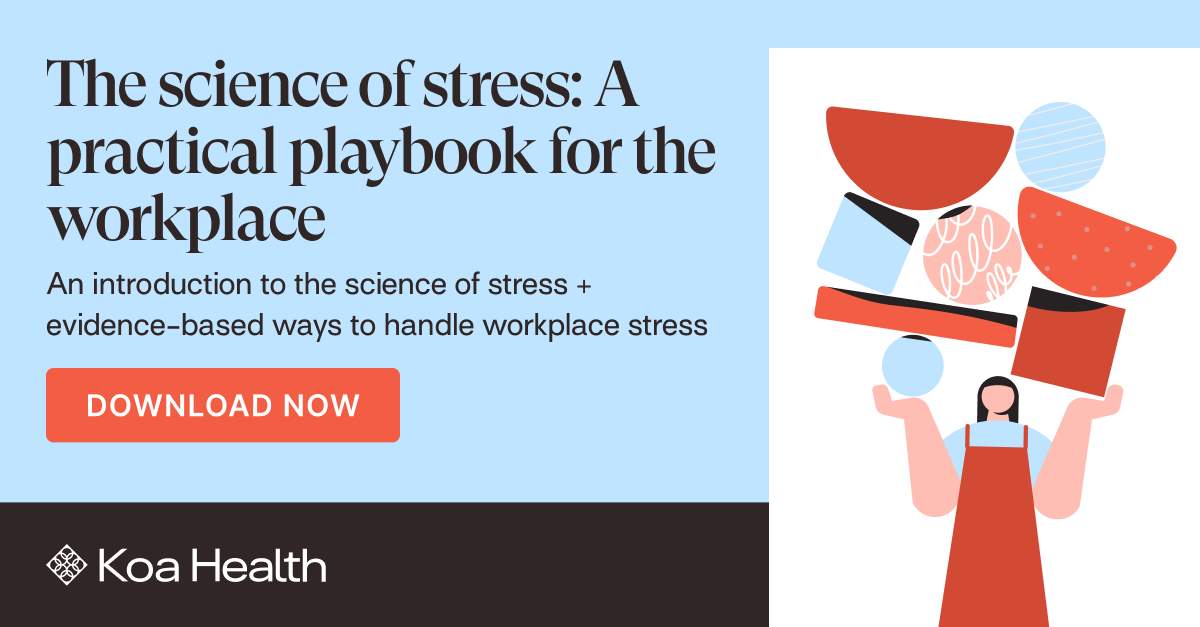Dr Anna Mandeville, UK Clinical Director and Dr Aleksandar Matic, R&D Director at Koa Health, discuss the inherent challenges private medical insurers and employers face in finding mental health solutions that successfully combine ethics, accessibility and strong science to support mental wellbeing
Mental healthcare has an accessibility problem. Distance, time, and cost continue to make it difficult for many to access the mental health solutions they need. As employees increasingly turn to their employers, private medical insurers (PMIs), and employee assistance programmes (EAPs) to help them resolve issues of access, many of these are leaning toward digital solutions.
But while app-based mental health and well-being platforms are more popular than ever, evidence base, ethics and accessibility continue to be a concern – and effective care can only happen when all three elements are present.
Mental health solutions delivered on apps
App-based solutions have been shown to effectively boost markers of mental well-being and diminish the symptoms of mental conditions (such as depression) in research published in the Lancet (1) and PLOS Digital Health (2). However, comparatively, few have strong science to back them up. This makes it hard for individuals and care systems to trust these solutions with people’s well-being, not to mention their private data.
So, are ethics and evidence base compatible with ease of access? What makes an app effective, trustworthy, and easy to use? Here are some key elements to consider.
Four qualities to look for in a mental health app
- Scientifically proven expertise and innovation
- Find out who’s creating and curating content and services. Ideally, you’ll see long-term collaborations with leading educational and industry institutions. There should also be qualified experts in-house, a scientific advisory board, declared conflicts of interest, published clinical research and cutting-edge patents.
- A comprehensive range of modalities and activities
- Too many mental health solutions limit the clinically validated techniques and frameworks employed, thus limiting their ability to address people’s varying needs and preferences. Well-rounded solutions must be grounded in more than one science-based, well-established framework. Some frameworks that have been clinically proven to benefit people across the full continuum of mental health include Cognitive Behavioural Therapy, Acceptance Commitment Therapy, and Positive Psychology. For maximum uptake and useability across the broadest cohort of users possible, solutions must include a wide range of activities and modalities.
- Regularly reviewed inclusion and accessibility
- For maximum inclusion and accessibility, consider languages available, standardised reading levels, and accessible design. Are there both mobile and web app versions? Do they work with a screen reader? What bias checks are used in content production? Does the app undergo regular 3rd-party audits and evaluations?
- Safety and ethical data treatment
- To deliver effective care, It is vital that providers must secure patients’ trust. This is why it’s crucial that any digital mental health solution be carefully vetted for safety and ethical data use. Mental health and wellbeing apps being used for patient care must be clinically tested and independently rated safe for their intended use by a trustworthy third-party reviewer such as ORCHA (the evaluator of health apps used by NHSX). They should also be GDPR compliant and clearly communicate how data is processed and used in language that’s easily understood by laypeople, not just legal experts.
Digital-first mental health solutions
With thousands of digital-first mental health solutions on the market and comparatively few with solid science to back them up, it’s a daunting challenge to separate apps grounded in evidence and developed by experts from the rest. How can PMIs, EAPs and employers find services that are accessible and inclusive, supported by appropriate clinical rationale, and handle data securely?
Find out which questions to ask potential providers and get further tips on how to evaluate the evidence base of mental health solutions and their trustworthiness in our guide to mental health solutions, evidence base and trustworthiness.
About Koa Health
Koa Health is the leading global provider offering evidence-based, personalized, integrated solutions and services that deliver mental health for everyone. Available to more than 3 million users worldwide, Koa Health addresses the full continuum of mental health needs – from prevention to treatment.
Backed by investors such as Telefónica, a consortium advised by Ancora Finance Group, Wellington Partners Life Sciences, and MTIP, Koa Health leverages deep clinical expertise, research, and technology to deliver effective and accessible care that adapts to users’ unique circumstances, leading to lasting behavior change and positive health outcomes. Koa Health partners with employers, health plans, health systems, and providers worldwide, with its headquarters in the Netherlands and operations in Boston, London, and Barcelona.
To find out more, visit www.koahealth.com or contact us at info@koahealth.com
References
- https://www.thelancet.com/pdfs/journals/lanpsy/PIIS2215-0366(20)30256-X.pdf
- https://journals.plos.org/digitalhealth/article?id=10.1371/ journal.pdig.0000002

This work is licensed under Creative Commons Attribution-NonCommercial-NoDerivatives 4.0 International.












